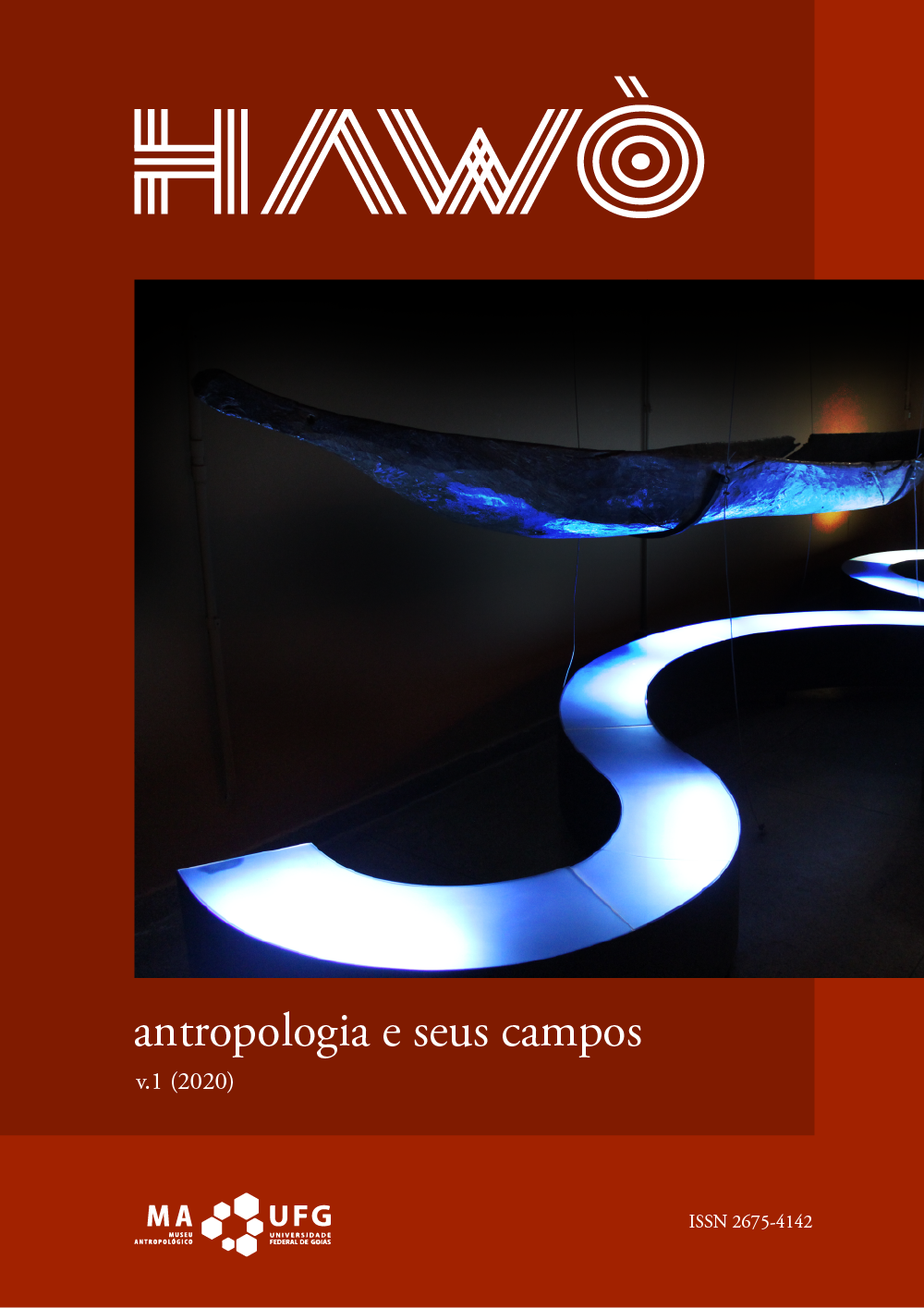“P’a gozar con el ritmo del tambó”
corpo, movimento e emoção na epistemologia do ritmo de Victoria Santa Cruz
Palavras-chave:
Afroperuanidad, Ancestralidade, Autoetnografia, DecolonialidadeResumo
Este artigo analisa a obra de Victoria Santa Cruz como uma epistemologia decolonial. A artista, diretora de teatro e intelectual afro-peruana foi pioneira na pesquisa, recriação e performance de manifestações culturais afro-peruanas. A partir de sua experiência, fundou uma epistemologia que pratica as artes negras como reivindicação da afro-peruanidad como parte da identidade nacional e, ainda, uma forma de produzir (auto)conhecimento que desafia a divisão entre mente, corpo e emoção, característica da metafísica moderna. Na epistemologia do “ritmo interior”, Victoria expande as possibilidades significativas das manifestações culturais tradicionais, entre elas, as negras, como meio para difundir suas reflexões e ainda incentivar a descolonização do ser. Este artigo estabelece o diálogo entre Victoria, as reflexões de intelectuais negros na diáspora e ainda minha trajetória como antropóloga negra brasileira trabalhando com imigrantes peruanos, entendendo a importância da experiência negra para também descolonizar a Antropologia da dança, do corpo e das emoções.
Referências
ARAÚJO, H. C. da S. Primeiro experimento autoetnográfico: negra metida soy. In: REUNIÃO DE ANTROPOLOGIA DO MERCOSUL, 13, 1, 2019, Porto Alegre. Anais [...]. Porto Alegre: UFRGS, 2019.
ARGUEDAS, J. No soy un aculturado. In: FELL, E. M. (ed.). El zorro de arriba y el zorro de abajo. 2 ed. Madrid: ALLCA XX, 1996 [1969]. p. 256-258.
BELISO-DE JESÚS, A. M.; PIERRE, J. Special Section: Anthropology of White Supremacy. American Anthropologist, v. 122, p. 65-75, 2020.
CHOCANO, R. Manifestaciones culturales, representación estratégica y agendas: reflexiones sobre el Patrimonio Cultural Inmaterial afroperuano. In: ENCUENTRO DE INVESTIGADORES SOBRE LA CULTURA AFROPERUANA, 2018, Lima. Anais […]. Lima: Ministerio de la Cultura, 2018. p. 169-177.
COLLINS, P. H. Aprendendo com a outsider within: a significação sociológica do pensamento feminista negro. Revista Sociedade e Estado, Brasília, v. 31, n. 1, p. 99-127, 2016.
COLLINS, P. H.; BILGE, S. Intersectionality. Cambridge: Polity Press, 2016.
CUNHA, J. A. De. O. Em busca de um espaço: a linguagem gestual do candomblé – à memória de Marlene de Oliveira Cunha. Cadernos de Campo, São Paulo, v. 26, n. 1, p. 15-41, 2017.
DA COSTA, E. V. A dança negra de Mercedes Baptista Corporeidades Afro-Diaspóricas em diálogo. Dissertação (Mestrado em Estudos Contemporâneos em Artes) – Programa de Pós-Graduação Estudos Contemporâneos das Artes, Universidade Federal Fluminense, Niterói, 2020. No prelo.
DANIEL, C. Diálogos amefricanos: representações de afroperuanidad nos Estados Unidos. Washington DC, Howard University, 2020a. No prelo.
DANIEL, C. Quando me descobri índia: processos de racialização na experiência migratória de peruanos no Rio de Janeiro. Vibrant, Rio de Janeiro, 2020b. No prelo.
DANIEL, C. Más allá del festejo: representaciones afroperuanidad en Rio de Janeiro. In: SEMINARIO INTERNACIONAL: LOS AFROPERUANOS EN LAS AMÉRICAS: 200 AÑOS DE VIDA REPUBLICANA, CIUDADANÍAS INCOMPLETAS, Lima. Anais […]. Lima: CEDET, 2019a. No prelo.
DANIEL, C. O folclórico das danzas folklóricas: a dança como espaço de (re) afirmação de identidade entre peruanos no Rio de Janeiro. In: Religiosidade e Performance: diálogos contemporâneos. Rio de Janeiro: Mauad X, 2015. p. 33-46.
DANIEL, C. P’a crecer en la vida: a experiência migratória de jovens peruanos no Rio de Janeiro. 2013. 292 f. Tese (Doutorado em Ciências Sociais) – Programa de Pós-Graduação em Ciências Sociais, Pontifícia Universidade Católica do Rio, Rio de Janeiro, 2013.
DE JESUS, R. A performance negra de Victoria Santa Cruz e suas reverberações na construção de escrevivências e feminismos negros. 2020. 143 f. Dissertação (Mestrado em Performances Culturais) – Programa de Pós-Graduação Interdisciplinar em Performances Culturais, Universidade Federal de Goiás, Goiânia, 2020.
DE LA CADENA, M. ¿Son los mestizos híbridos? las políticas conceptuales de las identidades andinas. Humanística, Bogotá, v. 61, n. 1, p. 51-84, 2006.
DUNHAM, K. The negro dance. In: Kaiso!: writings by and about Katherine Dunham. Madison: University of Wisconsin Press, [1941] 2005. p. 217-226.
FALCÃO DOS SANTOS, I. Dança e pluralidade cultural: corpo e ancestralidade. Múltiplas Leituras, São Paulo, n. 1, v. 2, p. 31-38, 2009.
FELDMAN, H. C. Ritmos negros del Perú: reconstruyendo la herencia musical africana. Lima: IEP, 2009.
GONZALEZ, L. A categoria político-cultural de amefricanidade. Tempo Brasileiro, Rio de Janeiro, v. 92/93, n. 1, p. 69-82, 1988.
GREENE, S. Entre lo indio, lo negro y lo incaico: la jerarquía espacial de la diferencia en el Perú multicultural". Tábula Rasa, Bogotá, v. 13, n. 1, p. 111-146, 2010.
LA FUNCIÓN de la palabra. [Entrevista concedida a] Marco Aurelio Denegri. TV Perú, [2005?]. (48:32min). Disponível em: https://youtu.be/DMu6BkUJ-Os Acesso em: 9 set. 2020.
LLANOS, F. E. El renacer afroperuano de 1950: discursos sobre la música negra de la costa peruana. Orfeu, Florianópolis, v. 3, n. 2, p. 25-43, 2018.
LLANOS, F. E. Black is Beautiful: Victoria Santa Cruz. In: CONGRESSO DA ASSOCIAÇÃO NACIONAL DE PESQUISA E PÓS-GRADUAÇÃO EM MÚSICA, 24, 2014. São Paulo, Anais […]. São Paulo: USP, 2019.
LEWIS, E.; THOMAS III, J. Me gritaron negra: the emergence and development of the Afro-descendant women’s movement in Peru (1980-2015). Journal of International Women's Studies, Bridgewater, v. 20, n. 8, p. 18-39, 2019.
MCCLAURIN, I. Introduction: forging a theory, politics, praxis, and poetics of Black Feminist Anthropology. In: Black Feminist Anthropology: theory, politics, praxis and poetics. Piscataway: Rutgers University Press, 2001. p. 1-23.
MCCLAURIN, I. Theorizing a black feminist self in Anthropology: toward an autoethnographic approach. In: Black Feminist Anthropology: theory, politics, praxis and poetics. Piscataway: Rutgers University Press, 2001. p. 49-76.
NASCIMENTO, A. O genocídio do negro brasileiro: processo de um racismo mascarado. São Paulo: Perspectivas, 2016.
NASCIMENTO, A. Katherine Dunham and us. In: Kaiso!: writings by and about Katherine Dunham. Madison: University of Wisconsin Press, [1950] 2005. p. 317-320.
NASCIMENTO, B. Beatriz Nascimento: quilombola e intelectual – possibilidades nos dias da destruição. Diáspora Africana: Filhos da África, 2018.
RETRATOS. Documentário com Victoria Santa Cruz – parte 1. TV Perú, [200-?] (17:12 min). Disponível em: https://www.youtube.com/watch?v=Fx4ZiluO6gE Acesso em: 10 set. 2020.
SANTA CRUZ, V. La magia del ritmo. TV Perú, 2004. (1:26:44 min). Disponível em: https://www.youtube.com/watch?v=WYKEMidE6bQ Acesso em: 15 set. 2020.
SANTA CRUZ, V. Ritmo: el eterno organizador. Lima: Petroperú, 2005.
SANTA CRUZ, V. El importante rol que cumple el obstáculo. Pittsburgh: [s. n.], 1999
SEGATO, R. L. Los cauces profundos de la raza latinoamericana: una relectura del mestizaje. Crítica e Emancipação, Buenos Aires, p. 11-44, 2010.
VARGAS, J. Can the line move? Antiblackness and the diasporic logic of forced social epidermalization. In: VARGAS, J. Critical ethnic studies: a reader. Durham: Duke University Press, 2016. p. 63-91.
VICTORIA, Black and Woman. Direção: Torgeir Wethal. Entrevista a Victoria Santa Cruz por Eugenio Barba (DVD). 1978. (21 min).
Downloads
Publicado
Como Citar
Edição
Seção
Licença
Os(as) autor(es/as) que publicam na Revista Hawò são os responsáveis pelo conteúdo dos artigos assinados e detém os direitos autorais. Concedem à revista, o direito de primeira publicação com o trabalho simultaneamente licenciado sob a Licença Creative Commons Atribuição-Não Comercial (Open Archives Iniciative - OAI). Esse recurso, utilizado para periódicos de acesso aberto, permite o compartilhamento do trabalho para fins não comerciais com reconhecimento da autoria. Caso o texto venha a ser publicado posteriormente em outro veículo, o autor deverá informar que o mesmo foi originalmente publicado como artigo na revista Hawò. Assim sendo, ainda que a revista seja detentora da primeira publicação, é reservado aos autores o direito de publicar seus trabalhos em repositórios institucionais ou em suas páginas pessoais, mesmo que o processo editorial não tenha sido finalizado.
É reservado à revista, o direito de realizar alterações de ordem normativa, ortográfica e gramatical visando manter o padrão de língua, respeitando-se, porém, o estilo dos autores.






